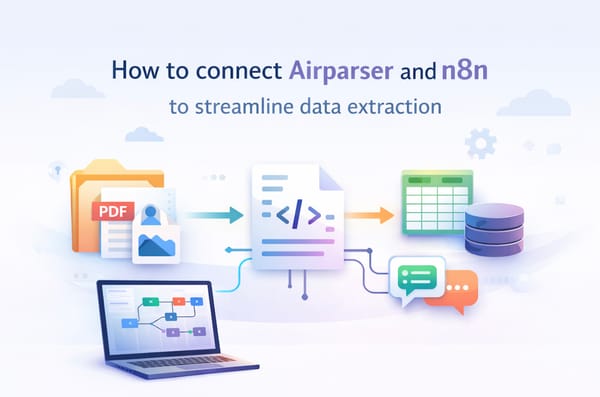The Role of AI in Document Parsing for Logistics Companies
Discover how AI enhances document parsing for logistics companies. Learn how Airparser increase accuracy, speed up processing, and handle unstructured data

In logistics, handling documents quickly and accurately is crucial. Whether it's invoices, shipment notices, or customs forms, these documents need to be processed efficiently to keep operations running smoothly. Traditionally, this has been a manual task, but with the rise of artificial intelligence (AI), document parsing has become faster and more accurate. In this article, we will explore how AI is enhancing document parsing for logistics companies and why it’s an essential tool for modern businesses.
Understanding AI in Document Parsing
What is AI in Document Parsing?
Artificial intelligence (AI) refers to computer systems that can perform tasks that usually require human intelligence. In document parsing, AI helps by automatically reading and extracting information from documents. This involves technologies like machine learning, where the AI learns from past data, and natural language processing (NLP), which helps the AI understand and process human language in documents.
Traditional vs. AI-Powered Document Parsing
Traditional document parsing relies on predefined templates and rules. For example, if you have an invoice, the system might look for the date in the top right corner or the total amount at the bottom. While this method works for structured documents, it struggles with unstructured or varied formats. AI-powered document parsing, on the other hand, doesn’t rely on rigid templates. Instead, it can adapt to different layouts and extract the necessary information regardless of where it’s located on the page.
For more information on different parsing methods, you can read our article on Zonal OCR vs GPT-Powered Data Extraction.

Benefits of AI-Powered Document Parsing for Logistics
Increased Accuracy
One of the main benefits of AI-powered document parsing is its accuracy. AI can analyze and extract data from documents with a high level of precision. It can recognize various formats, even if the document layout changes slightly. This accuracy is essential in logistics, where a small mistake in data entry can lead to significant issues, such as shipment delays or incorrect deliveries.
Faster Processing
AI can process documents much faster than humans. What might take a person several minutes to read and input manually, AI can do in seconds. This speed is crucial in logistics, where timely information is vital for making decisions. Faster document processing means quicker updates to the logistics management system, leading to more efficient operations.
Handling Unstructured Data
In logistics, not all documents follow a standard format. Emails, for example, are often unstructured and can contain important information scattered throughout the text. AI-powered parsing excels in these situations. It can read through unstructured documents, understand the context, and extract the necessary data. This capability allows logistics companies to automate the processing of a wider range of documents.
Adaptability
AI systems are designed to learn and improve over time. As they process more documents, they become better at recognizing patterns and extracting data more accurately. This adaptability is particularly useful in logistics, where document formats can vary widely depending on the supplier, customer, or region. An AI-powered system can adjust to these changes without needing constant manual updates.
Real-World Applications of AI in Logistics Document Parsing
Use Case 1: Invoice Processing
Invoices are a common document in logistics, and they need to be processed quickly to ensure timely payments and accurate financial records. AI-powered parsing can automatically extract key information from invoices, such as the invoice number, date, and total amount. This data can then be fed directly into the company’s accounting system, reducing the time spent on manual data entry and minimizing errors.
Use Case 2: Shipment Tracking
Shipment documents often contain vital information about delivery dates, tracking numbers, and destinations. AI can parse these documents and automatically update the logistics management system with the latest tracking information. This ensures that all relevant parties have up-to-date information, improving communication and reducing the risk of delays.
Use Case 3: Customs Documentation
Customs documents are typically complex and vary depending on the goods being shipped and the countries involved. AI can handle these variations by extracting the necessary data and ensuring that all required fields are completed accurately. This can help logistics companies avoid delays at customs and ensure compliance with international regulations.
For more on how AI can streamline logistics operations, you might want to check out our article on Simplifying Logistics Operations with Automated Document Parsing.

How Airparser Leverages AI for Document Parsing
AI Features in Airparser
Airparser uses advanced AI technology to help logistics companies manage their documents more efficiently. One of the key features of Airparser is its ability to create custom schemas. This allows businesses to define exactly how they want their documents to be parsed and what data should be extracted. The AI then learns from these schemas and improves its accuracy over time.
Airparser also offers AI-driven classification, which means it can automatically identify the type of document and apply the correct parsing schema. This reduces the need for manual sorting and ensures that each document is processed correctly.
Why Choose Airparser for Your Logistics Needs?
Logistics companies face unique challenges when it comes to document management. With its AI-powered features, Airparser is well-equipped to handle these challenges. It offers a high level of accuracy, can process documents quickly, and adapts to different document formats with ease. Additionally, Airparser is easy to integrate with existing logistics management systems, making it a cost-effective solution for improving document processing.
To learn more about the benefits of using Airparser in logistics, you can visit our article on How to Automate Document Classification and Parsing in Logistics.
Future of AI in Logistics Document Parsing
Emerging Trends
The future of AI in document parsing looks promising, with several emerging trends set to further enhance logistics operations. One such trend is AI-powered predictive analytics, which can help companies forecast demand and optimize their supply chains. Another trend is real-time data processing, where AI can instantly update systems with the latest information, reducing the lag between document receipt and data entry.
Continuous Improvement
AI technology is constantly evolving, and companies that stay updated with the latest advancements will have a competitive edge. At Airparser, we are committed to integrating the latest AI technologies into our platform, ensuring that our customers always have access to the best tools for their logistics operations.
Conclusion
AI is revolutionizing document parsing for logistics companies. By increasing accuracy, speeding up processing, and handling unstructured data, AI-powered systems like Airparser are essential for modern logistics operations. As AI continues to evolve, the benefits of using these systems will only grow.
If you’re looking to improve your logistics operations, consider integrating AI-powered document parsing with Airparser. With its advanced features and easy integration, Airparser can help you manage your documents more effectively and keep your operations running smoothly.
For more information on how Airparser can benefit your logistics operations, visit our blog or contact us directly.




